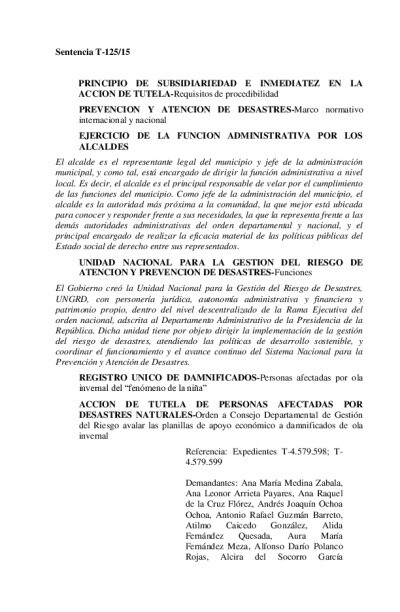
Date
Geographical Area
Andean countries
Countries
Colombia
Case Name
Sentencia T-125/15, Corte Constitucional de Colombia
Case Reference
Protection Action T-125/15
Name of Court
Constitutional Court of Colombia
Key Facts
Residents of the municipality of Zambrano, located in the Bolívar department of Colombia, were affected by the rainy season that occurred between 1-10 September 2011. Consequently, the national government established an economic subsidy for the victims through the National Unit for Disaster Risk Management. However, the mayor’s office of the municipality of Zambrano and the Local Committee for Attention and Prevention of Disasters of the municipality of Zambrano failed to carry out the corresponding registry of the victims for the second winter season of 2011, not sending the information to the National Unit for the Management of the Disaster Risk within the established terms. They also failed to monitor and accompany the delivery of financial support to the beneficiaries.
To protect their rights, the victims filed a protection action (acción de tutela) against the Bolívar Departmental Risk Management Council and the Zambrano Municipal Mayor’s Office. The entities allegedly violated their rights as victims by not granting them the economic subsidy recognised by the National Government for the victims of the second winter season of 2011.
To protect their rights, the victims filed a protection action (acción de tutela) against the Bolívar Departmental Risk Management Council and the Zambrano Municipal Mayor’s Office. The entities allegedly violated their rights as victims by not granting them the economic subsidy recognised by the National Government for the victims of the second winter season of 2011.
Decision and Reasoning
The Constitutional Court of Colombia first considered the international regulatory framework that sets standards for the prevention and care of disasters emerging from the UN, such as the Yokohama Strategy for a Safer World and its Plan of Action and the Hyogo Framework for Action on Disaster Risk Reduction 2005-2015. The Court argued that although they are part of the so-called ‘soft law’, they constitute parameters that help to understand, comprehensively and harmoniously, the scope of the obligations of States regarding the prevention of and response to disasters. The Court acknowledged that both instruments established the responsibility that falls on States to reduce the risk of natural disasters and protect its population, infrastructure, and assets from the effects of natural disasters.
The Court stated that as a result of international standards on disaster law at the domestic level, different norms have been enacted to regulate the matter of disaster prevention and care. Furthermore, the Court considered that State organs must develop their functions, fulfil their different tasks, and ensure the realisation of the national disaster risk management policy.
The Court also remarked that according to the Hyogo Framework the consequences of administrative disorganisation could not be transferred to those affected by natural disasters. States have the responsibility to reduce the risk of natural disasters, which is why it is imperative to adopt national policies that prioritise this issue.
The Court stated that as a result of international standards on disaster law at the domestic level, different norms have been enacted to regulate the matter of disaster prevention and care. Furthermore, the Court considered that State organs must develop their functions, fulfil their different tasks, and ensure the realisation of the national disaster risk management policy.
The Court also remarked that according to the Hyogo Framework the consequences of administrative disorganisation could not be transferred to those affected by natural disasters. States have the responsibility to reduce the risk of natural disasters, which is why it is imperative to adopt national policies that prioritise this issue.
Outcome
The Constitutional Court of Colombia confirmed that the victims of the floods had the right to receive the economic aid granted for the rainy season victims in September 2011. Additionally, the Court remarked that it is not under the constitutional order that individuals, in addition to suffering the tragic consequences of a natural disaster, have to bear the ineffective or negligent action of the public administration.
Disclaimer
This case law summary was developed as part of the Disaster Law Database (DISLAW) project, and is not an official record of the case.
Document
Document
External webpage